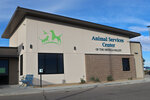Wind: mph,
Welcome to our new web site!
To give our readers a chance to experience all that our new website has to offer, we have made all content freely avaiable, through October 1, 2018.
During this time, print and digital subscribers will not need to log in to view our stories or e-editions.



The Animal Services Center of the Mesilla Valley will be governed differently in the future, pending approval from the state government.
Among a slew of administrative changes to the area’s animal center, the most significant change adds four members of the public to the Animal Services Center of Mesilla Valley Board of Directors. The four members of the public will act as full voting members and participate with the same rights and authority as elected officials.
The new board features four elected officials – two city councilors and two county commissioners. Two members of the public appointed by the city council and two members appointed by the county commission join them. The board also includes the city manager, the county manager or their designees.
Before the change, the board had three elected officials from the county and three elected officials from the city. It also had the county manager and city manager or their designees.
The discussions and votes occurred across several meetings in the fall of 2023, but the board had been examining modification as early as 2022.
ASCMV is a jointly funded operation between the county and the city. The two entities established the ASCMV in 2008 after the Doña Ana Animal Humane Society – which operated a shelter since 1985 – said they would no longer run the shelter. Since then, the city and county fund the operation yearly. According to the center’s statistics, ASCMV takes in over 700 animals – mostly dogs and cats – monthly.
The center reported that most intakes come from the public bringing in strays or from animal control officers bringing in strays.
It’s also one of the state’s “kill shelters,” or shelters that euthanize animals when they run out of space. Despite sending dozens of animals to other shelters or rescues each month, the center reported in November they euthanized 265 animals – all dogs or cats.
The ASCMV Board officially approved the governing changes at a meeting in September. The Board then confirmed that the city and county agreed to the changes during a meeting in December.
Barbra Bencomo, the city’s chief administrative officer and a non-voting member of the ASCMV Board, outlined another significant change to the ASCMV just before the vote in September: It established a Memorandum of Understanding, or MOU, which bounded differing responsibilities between the city, the county and the center.
For example, the city now oversees finances, human resources, information technology, risk management and the center’s vehicles. Bencomo also said the MOU brings the center more in line with city policy regarding personnel rules.
The MOU also outlined the center’s responsibilities, such as managing its budget.
Another change to a different governing document reduced the number of meetings per year from 12 (monthly) to four (quarterly). Some members of the board raised concerns about this, noting that some monthly meetings can last up to four hours. But their concerns were assuaged since the board can call special meetings and has several subcommittees where information is presented.
The board also gave the city of Las Cruces the right to audit the center regularly.
Kasandra Gandara, former city councilor and ASCMV Board member, raised concerns about the experiences of public board members before the ASCMV board approved the change. Gandara asked what training the public board members would receive after an appointment.
Clint Thacker, the ASCMV Executive Director, said the county and city would decide on an appointment process, which could vet unqualified or inexperienced candidates from the running. Beyond that, Thacker said he’d provide the new members with informational packets and be available to them.
“Also, the hope is that these individuals would already be fluent in a lot of the terminology and the things that we use, and we talk about in the animal industry,” Thacker said. “We have some great people here in the community that could easily fill this role.”
Still, Gandara said her concerns were more on the budget side of governing the center. She said she could anticipate issues where the city and county could not agree on a budget. She said the lack of official representation would exacerbate the problem.
“I’m all for having the public in. I think that’s a really important aspect and something that we’ve never done,” Gandara said. “That’s not at all my concern. It’s about how drastic the change is and then what happens during budget season.”
How the new board handles budgeting remains to be seen -- and may not be seen for a while.
Now that the city, county and ASCMV Board have adopted the changes, one final step must occur. The New Mexico Department of Finance and Administration or DFA, which approves all inter-government agreements in the state, must approve the new structure.
Bencomo confirmed to the Bulletin on Dec. 29 that the documents were still being reviewed and had not yet been sent to DFA. She estimated that they’d be sent during the first week of January